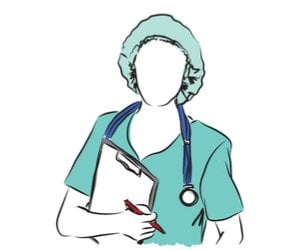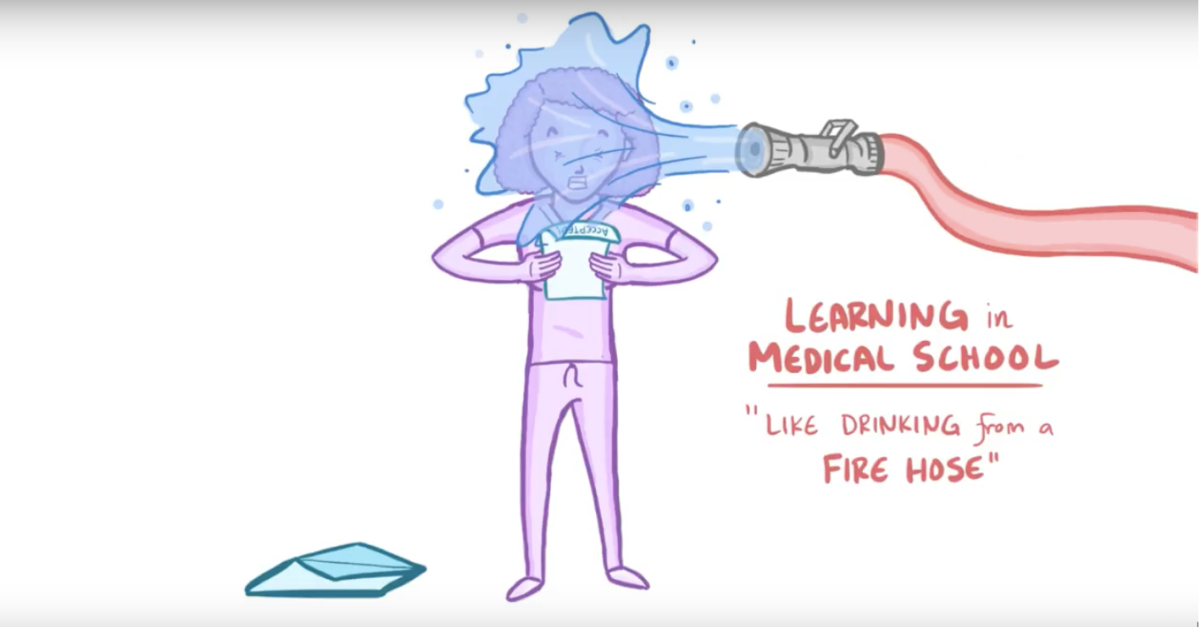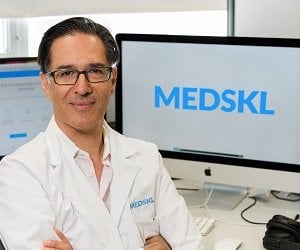Dr. Ali Wong is a plastic surgery resident in Nova Scotia, Canada and creator of the website Sketchy Medicine, in which she shares graphical representations of various medical concepts. Dr. Wong received her Bachelor of Science with Honours in Neuroscience (2009) and her MD (2013) at Dalhousie University. Following initial year in residency, she went on to receive an MSE (Master of Science in Engineering) from Johns Hopkins University (2016). Dr. Wong has been published in Plastic and Reconstructive Surgery, Journal of Hand Therapy, and Behavioral Brain Research.
medical student
Four Ways to Practice Teaching as a Medical Student
During the first years of medical school, we are taught a huge volume of material, covering basic sciences and organ systems. It is not until our clinical rotations that we truly begin to experience medicine in real time. Over our clinical years, we learn how to become comfortable with patients and help them become comfortable with us. Ultimately, we hone our ability to communicate knowledge to our patients. In modern medicine, we work as a team with our patients toward improvement of their health. We are the scientific experts, but require the patient’s help to learn about their expertise: the patient’s own body. For a patient to make the best decisions, we need to effectively teach patients about their situation at a level where the patient can make an informed, proper decision. How can we practice our teaching skills as medical students?
The Benefits of Mindfulness
Mindfulness practices have gained momentum in the modern world and with good reason: they are … Read more
Life Hacks for the Medical Family
In my previous article, “Division of Labor: How to Keep a Household Running While Your … Read more
Surviving Your First Year of Medical School
Congratulations on getting accepted to medical school! Becoming a physician is a long and tough journey, and you may not be able to get by using the same methods that helped you succeed in undergrad. To maintain control while drinking from the “fire hose” of medical school, you’ll need to make sure you do these four things:
Getting What You Want: Considering Both Life and Career Goals When Choosing a Specialty
Under the glow of the OR lights, I could barely make out the pulsating artery through all the layers of fat. This is so cool I thought to myself. Since my first rotation had been internal medicine, I hadn’t seen a lot of hands on stuff like this. As the OB/GYN swiftly cut through the layers of fascia to get to the target ovary, I watched her quick hands harvest it and pull it out of the body cavity. The ovary itself was grossly misshapen as she gently laid it onto the mayo stand to clean it up before shipping it off to pathology. I held it in my hands and thought of how the patient would no longer have to bear the burden of the things this overgrowth was doing to her body. The surgery was a success and the doctor predicted a very good outcome and quality of life for the young patient from now on. How incredible!
Best Medical Apps for Students – Clinical Practice Guidelines
Updated February 5, 2022. The article was updated to correct minor grammatical errors and formatting … Read more
A Physician’s Mission: Using Radio to Increase Health Literacy
Republished with permission from here. Dr. Pablo Rodriguez, an OB/GYN, doesn’t have a typical office.Inside … Read more
Jump Starting Your Job Search While In Medical School: Part 5
Read about steps 1 and 2 in Part 1 of this series here.
Read about steps 3 and 4 in Part 2 of this series here.
Read about steps 5 and 6 in Part 3 of this series here.
Read about steps 7 and 8 in Part 4 of this series here.
One day in the future, all your work will have paid off: You’ll have finished your job interviews and you will be fielding job offers. OK, so it’s a ways away in the future. But it’s valuable to understand the process now; you can spend your time focusing on opportunities that are a true fit for your interests and values. This laser focus on what you want and what you’re good at will mean that the job offers coming your way will be good fits for you. Then, the challenge is simply choosing one.
Applying for Residency
Last month I wrote about the early part of 4th year as a kind of second-look for medical students – an occasion for confirming specialty choice, or perhaps changing one’s mind altogether. For me, it has been an enjoyable and enlightening process to revisit the specialties I was most interested in and examine them more thoroughly, paying attention to finer details as I considered what a career in that specialty would entail beyond the years of residency. The specialty decision is often made on just a few weeks of exposure and may be highly influenced by observing residents, but it is important to remember that residency is relatively brief in the context of a career, and thus it is imperative to get opinions on the field of choice from practicing attending physicians. I have been grateful for opportunities to do just this; rotating through a field a second or third time has enabled me to make this aspect more of a priority.
Planning and Time Management for Boards Success
No matter how you plan on preparing for boards, getting started sooner than later is … Read more
12 Tips to Prepare for the COMLEX
If you’re like most medical students, your “To-Do” list is probably never ending! Between hectic … Read more
How to Get The Residency You Want
Updated September 9, 2021. The article was updated to correct minor grammatical errors and to … Read more
Jump Starting Your Job Search While In Medical School: Part 4
Read about steps 1 and 2 in Part 1 of this series here.
Read about steps 3 and 4 in Part 2 of this series here.
Read about steps 5 and 6 in Part 3 of this series here.
As a medical student, you’re likely very focused on listening to lectures and passing exams. Good! But by having an awareness of what the next steps in your professional journey are—specifically, pursuing and landing job opportunities—you will be well-prepared and in a position to cherry pick your job opportunities.
Q&A with Dr. Sanjay Sharma, Ophthalmologist and Founder of MEDSKL
Tell us about yourself. Why did you first decide to become a physician
I am a clinician-scientist who specializes in retinal disease. I grew up in Nova Scotia and went to medical school at Dalhousie University. I performed residency at Queen’s University, and obtained fellowships in retina from Wills Eye Hospital in Philadelphia and Mass Eye and Ear in Boston. I also obtained master’s degrees in epidemiology and business after becoming an ophthalmologist.
On a personal note, I married my wife, Susan (also a physician) during residency and we have 2 wonderful kids.
A few fun facts: I survived a near death experience fishing in the Gulf of Mexico – which taught me a lesson about how quickly the weather can change; came to skiing late in life but now routinely ski glaciers in the summer, and recently became an unexpected art agent (as our 14-year-old son’s work is being acquired by collectors in a number of countries).
As to why I became a physician? When I was 15 years old, my mother was hit in the eye with a tennis ball and suffered from a retinal detachment, which required surgery. Because of this experience, I became very interested in the eye, the retina, and ocular surgery. I actually went to medical school with the intent of becoming a retinal specialist.
Q&A with Dr. Emma Stanton, Psychiatry, Population Mental Health
Dr. Emma Stanton is a psychiatrist and Regional Chief Partnerships Officer at Beacon Health Options, a company which is uses a data-driven approach to work with mental health service providers across the US. She is also CEO of its international subsidiary Beacon UK, co-founder and director of the mentorship network Diagnosis, and a General Advisory Council Member at The Kings Fund.
Dr. Stanton obtained her medical degree from Southampton University (2000), completed her MRCPsych from the Royal College of Psychiatrists (2005), and obtained her MBA at Imperial College London (2009).
Prior to working at Beacon Health Options, Dr. Stanton completed her clinical training at the South London and Maudsley NHS Foundation Trust. She has also served as Clinical Advisor to the Chief Medical Officer at the Department of Health in London, which included placements to BUPA and the World Health Organization.
Top 8 Strategies to Prepare For and Ace Your Multiple Mini Interview (MMI)
The Multiple Mini Interview, commonly abbreviated to “MMI”, is one of the most dreaded interview … Read more
Choosing a Specialty: Taking a Second Look
By Brent Schnipke
As I have spoken with physicians, residents, and other medical students about the process of choosing a medical specialty, the near-universal reply has something to do with the fact that third-year rotations barely offer enough exposure to each specialty to make an informed decision. Third-year medical students move quickly between specialties, and are often granted only a few weeks to examine a given career choice and decide whether they like it or not. Because of this, major decisions about how a medical student will practice as a doctor are largely based on brief experiences that can be easily biased by particular patients, residents, attendings, hospital systems, and even external life factors. To control for these variables, most students will finish their third year and use the first part of their fourth year to take a “second look” at the specialty they are planning to apply for and to help those students who remain undecided.
How The Timing of your Doctor Job Search Could Lead to a Financial Windfall
You most likely believe the best time to start your medical job search is late autumn of the final year of training. That’s the standard advice, but it may not be the best for you. First, you will be just one of many job-applicants fighting for limited openings. Secondly, you will not have adequate time for preparation—you need your market value report and negotiation skills training completed before you start the process. In the rush to prepare for board exams, move, find a place to live, and find a job all at the same time you may have to skip the prep work and might not be able to bargain for the best deal.
Differentials
Republished with permission from here. Summer It didn’t take long for the truth to come … Read more



















